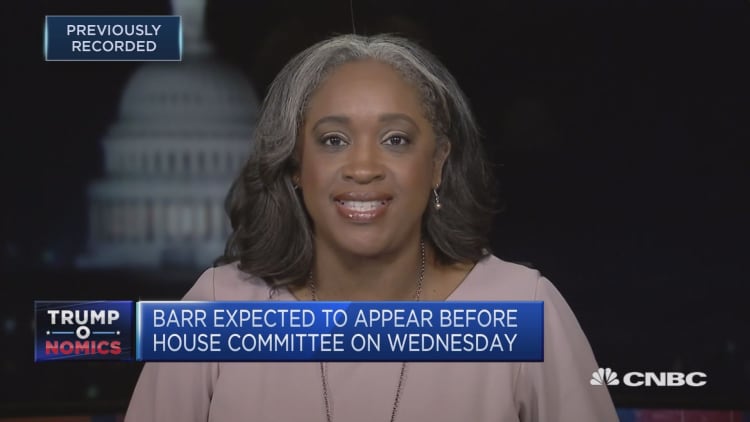Rod Rosenstein, the deputy attorney general whose appointment of special counsel Robert Mueller roiled the Trump administration for two years, has submitted his resignation to President Donald Trump.
Rosenstein's resignation is effective May 11. He said in a speech last week that he would leave his Justice Department post in May but did not reveal a specific date then.
Rosenstein's announcement comes two weeks after the release to Congress and the public of a redacted version of Mueller's final report by Attorney General William Barr.
His resignation letter to Trump made pointed mention of the Justice Department's responsibility to "avoid partisanship" and to uphold the "supremacy of the law."
"We enforce the law without fear or favor because credible evidence is not partisan, and truth is not determined by opinion polls," Rosenstein wrote. "We keep the faith, we follow the rules and we always put America first."
The letter did not mention Mueller by name or make specific mention of the findings in the report.
But several parts of the letter seemed to be refer to the special counsel's investigation and to his final report.
That report found no evidence that Trump's presidential campaign coordinated with Russians who were trying to influence the American electorate to support Trump's bid for the White House in 2016.
Mueller's report did not accuse Trump of obstructing justice by trying to interfere with the probe of Russian interference, but did say, "The President's efforts to influence the investigation were mostly unsuccessful, but that is largely because the persons who surrounded the President declined to carry out orders or accede to his requests."

Trump has long been infuriated by Mueller's investigation, which he has repeatedly called a "witch hunt."
Trump blamed his first attorney general, Jeff Sessions, for setting Mueller's appointment as special counsel in motion by recusing himself from oversight of investigations into election meddling by Russia and the question of possible collusion by the Trump campaign. Sessions was fired in November.
Rosenstein was responsible for the decision to appoint Mueller as a result of Sessions' recusal.
In his resignation letter, Rosenstein wrote, "Our nation is safer, our elections are more secure, and our citizens are better informed about covert foreign influence efforts and schemes to commit fraud, steal intellectual property, and launch cyberattacks."
The letter also said that the Justice Department has "made rapid progress in achieving the Administration's law enforcement priorities — reducing violent crime, curtailing opioid abuse, protecting consumers, improving immigration enforcement, and building confidence in the police — while preserving national security and strengthening federal efforts in other areas."
Barr, in a statement, said, "Rod Rosenstein has served the Department of Justice with dedication and distinction for nearly thirty years as a prosecutor, Deputy Assistant Attorney General, U.S. Attorney, and as Deputy Attorney General."
"His devotion to the Department and its professionals is unparalleled. Over the course of his distinguished government career, he has navigated many challenging situations with strength, grace, and good humor," Barr said. "Rod has been an invaluable partner to me during my return to the Department, and I have relied heavily on his leadership and judgment over the past several months."
"I have appreciated the opportunity to work closely with him, and I wish him well in his future endeavors. The Department and I will miss him."
Read Rod Rosenstein's resignation letter:


